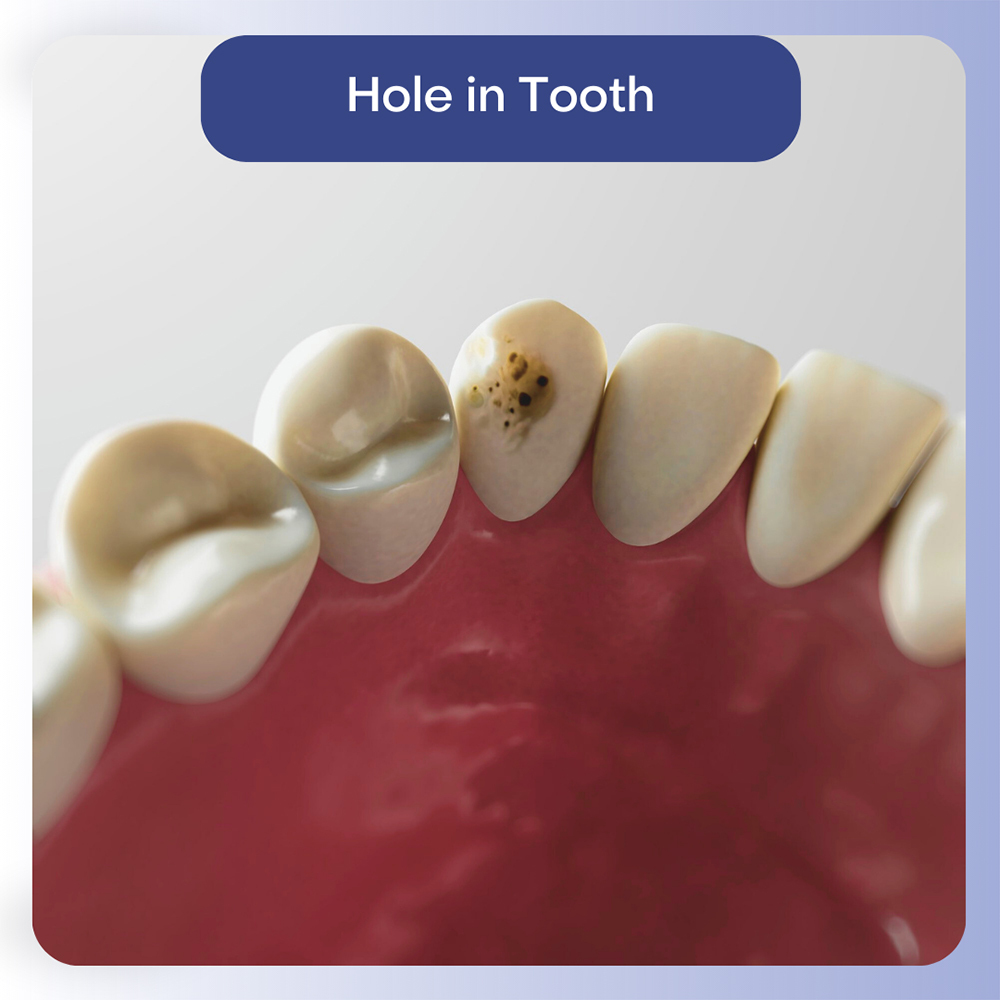Table of contents
Tooth decay an extremely common dental condition that’s caused by bacteria and acids in the mouth. These bacteria produce acid that weakens tooth enamel, gradually causing enamel erosion. Eventually, a hole in a tooth develops. Enamel erosion can occur more quickly if someone has an acidic diet.
 While cavities do not hurt when tiny, they can cause other symptoms like tooth sensitivity to hot and cold or pressure. You may notice a white area on the tooth, which is a small lesion, or a visible pit or hole in the tooth that may look gray, brown, or black. If you notice a tiny hole in the tooth, please make an appointment to see us quickly.
While cavities do not hurt when tiny, they can cause other symptoms like tooth sensitivity to hot and cold or pressure. You may notice a white area on the tooth, which is a small lesion, or a visible pit or hole in the tooth that may look gray, brown, or black. If you notice a tiny hole in the tooth, please make an appointment to see us quickly.
Otherwise, the easiest way to detect a tiny hole in a tooth is to see our dentist regularly for dental exams. During dental exams, we check the condition of every tooth, carefully probing it for any signs of soft spots or weak areas and looking for any small cavities. We may take a dental x-ray to check how far the cavity extends into your tooth if necessary.
A small to medium-sized cavity is normally very easy to treat. Our dental expert in Hackensack, NJ can remove the damaged and decayed portion of the tooth, carefully shaping the cavity before inserting a suitable material to restore it. Usually, this is a composite resin in a shade closely resembling the tooth’s natural color.
If the cavity is larger, treatment may be more complicated. You may need a porcelain inlay or onlay to mend a cavity in a larger back tooth. If the cavity is deeper and has reached the tooth nerve, you will need root canal therapy to remove the nerve and other soft tissues in the central part of your tooth. The treatment eliminates the bacterial infection and tooth nerve pain.
It is impossible to treat the cavity at home as professional dental care involves more than merely filling the hole in the tooth.
Treatment ensures all the decay and infection in the tooth is removed before the cavity is filled. The filling ensures the tooth is strong enough to function properly and is fully sealed to resist further attacks by bacteria and acid. Only a durable, professionally placed filling can achieve this result.
If you leave a cavity untreated, you risk losing the tooth. Unless the infection and decay are removed and the tooth properly sealed, it will continue to worsen. The infection can eventually cause a painful toothache, and a dental abscess may form. There is a risk you may need emergency dental care.
In comparison, a tiny hole in a tooth is quick, easy, and inexpensive to treat.
Most people are at risk of developing a hole in a tooth, but certain factors play a role in tooth decay. These include a diet high in sugars and carbohydrates; these foods interact with cavity-causing bacteria, fuelling them so they can create acid that erodes tooth enamel.
Children are more likely to develop cavities as their tooth enamel is thinner and weaker. However, adults are also at risk, especially if they have older fillings that may have begun to crumble and weaken over time.
A consistent, good oral care routine is the easiest way to prevent cavities and all the associated complications. We recommend seeing a dentist twice a year for dental checkups and hygiene appointments so we can ensure you are brushing and flossing correctly and detect any changes to your teeth quickly.
Even if a hole in a tooth is painless, receiving treatment as soon as possible is critical.

My name is Victoria Kushensky. I am a general dentist dedicated to remaining at the forefront of my field. Combining compassionate care with extensive knowledge, I offer cosmetic and general dentistry services as well as advanced root canal treatments.
I earned my Doctor of Dental Surgery (DDS) degree from the esteemed New York University College of Dentistry. Throughout my career, I have honed my skills in various dental procedures, ensuring effective treatment for each patient’s unique needs. I prioritize patient comfort and understanding, taking the time to thoroughly explain procedures and address any questions.
More about Dr. KushenskyMy NJ Dentist: Victoria Kushensky, DDS
385 Prospect Ave Suite 304
Hackensack, NJ 07601
(201) 298-8000